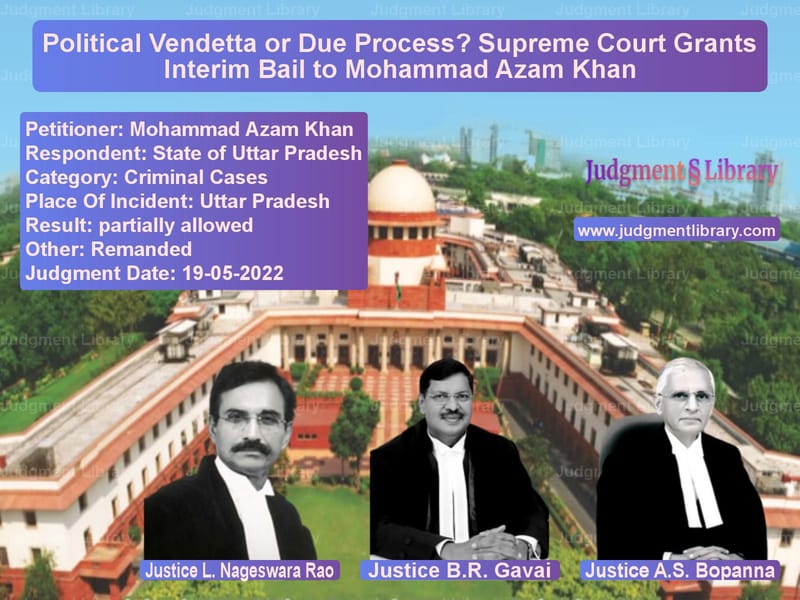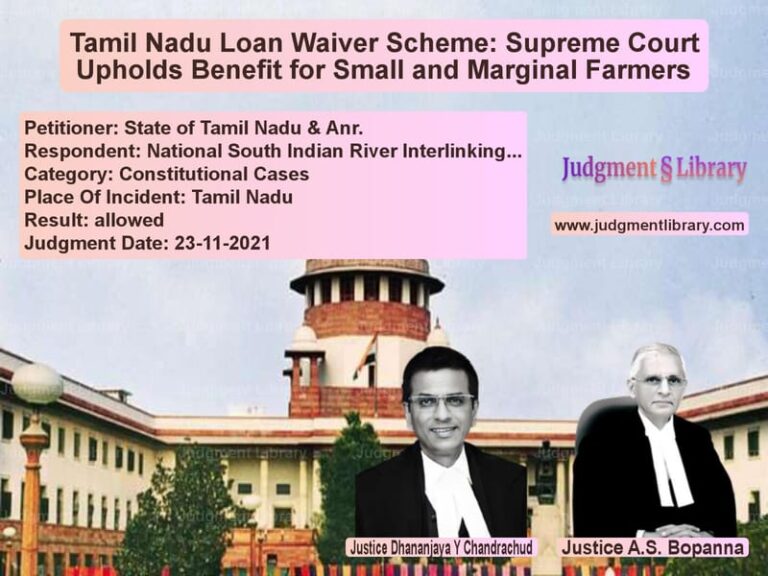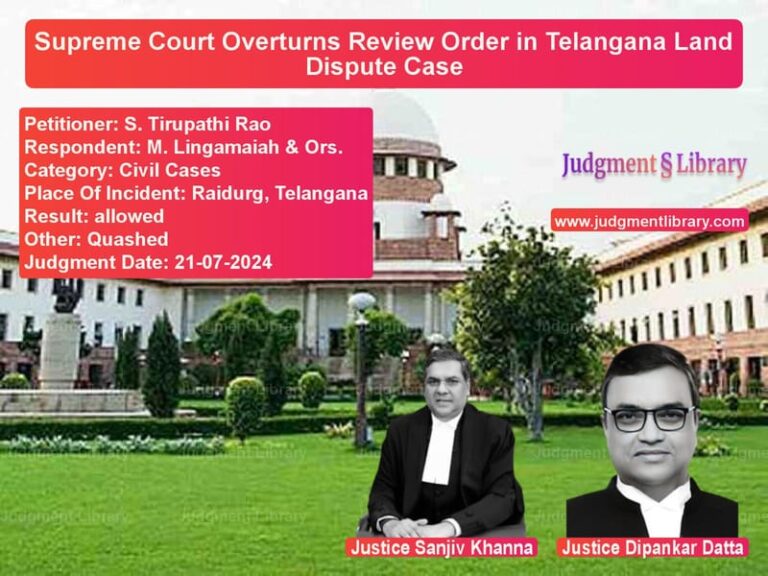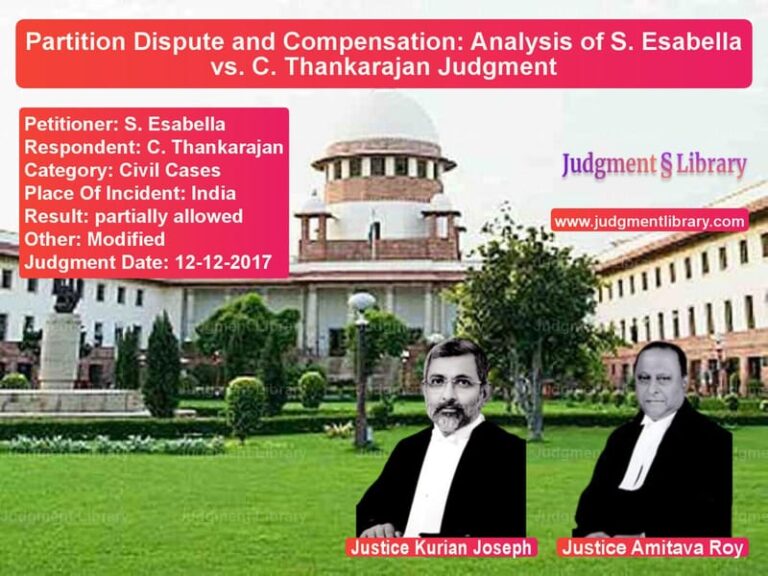Political Vendetta or Due Process? Supreme Court Grants Interim Bail to Mohammad Azam Khan
The Supreme Court of India recently ruled on a high-profile criminal case involving senior politician Mohammad Azam Khan. The case, Mohammad Azam Khan vs. State of Uttar Pradesh, revolved around multiple criminal charges filed against the petitioner and his claims that these cases were politically motivated. The Court granted interim bail, directing the trial court to determine his regular bail plea while ensuring justice and upholding personal liberty.
Background of the Case
Mohammad Azam Khan, a prominent political leader in Uttar Pradesh, approached the Supreme Court seeking relief from multiple criminal cases lodged against him. He argued that he was facing political persecution, as 84 out of 87 FIRs against him were registered after a new government came into power in 2017. The petition sought interim bail in a case related to alleged forgery and conspiracy under Sections 420 and 120B of the IPC.
The primary contentions in this case included:
- Whether the multiple FIRs were a result of political vendetta.
- Whether the delay in granting bail in one pending case justified Supreme Court intervention.
- Whether the petitioner was being unfairly implicated in additional cases to prolong his detention.
Arguments of the Petitioner
The petitioner, represented by senior advocate Kapil Sibal, argued:
- Most of the criminal cases against him were registered after 2017, indicating political targeting.
- He had already been granted bail in 84 out of 87 cases, and the delay in his remaining bail plea was deliberate.
- Despite securing bail in previous cases, he was suddenly implicated in a new case (FIR No. 70 of 2020) to prevent his release.
- The delay in granting bail violated his fundamental right to personal liberty under Article 21 of the Constitution.
Arguments of the Respondents
The State of Uttar Pradesh, represented by Additional Solicitor General S.V. Raju, countered:
- The petitioner was a habitual offender involved in land grabbing and multiple financial irregularities.
- The police had every right to investigate new leads and implicate additional accused if further evidence emerged.
- Granting bail to the petitioner would hinder the investigation and might lead to witness intimidation.
- The claim of political vendetta was unsubstantiated and should not interfere with the due process of law.
Supreme Court’s Observations
The Supreme Court ruled in favor of granting interim bail to Mohammad Azam Khan. The key observations were:
- “The petitioner has already been granted bail in 84 out of 87 cases. The delay in hearing his bail application in the remaining case raises concerns regarding his personal liberty.”
- The Court acknowledged that repeated FIRs filed in a short span could indicate political motives but refrained from making a final determination on this point.
- While the State argued that new charges were filed based on fresh evidence, the timing of such actions appeared questionable.
- The Supreme Court emphasized that bail is the rule and jail is the exception, ensuring that procedural delays do not infringe upon constitutional rights.
Judgment and Directions
The Supreme Court ruled as follows:
- Interim bail granted: Mohammad Azam Khan was granted interim bail in FIR No. 70 of 2020.
- Regular bail application to be decided: The trial court was directed to decide his bail plea within two weeks.
- Liberty not to be curtailed: The Court warned against repeated implicating of the petitioner in new cases to prolong his detention.
- No interference with legal process: The Court clarified that its order did not imply a comment on the merits of the case.
Key Takeaways from the Judgment
- The Supreme Court reaffirmed that procedural delays should not result in indefinite detention, especially when multiple bails have been secured.
- Political vendetta claims must be weighed against due process, ensuring that justice prevails over possible misuse of legal provisions.
- The ruling highlights the importance of judicial scrutiny in cases where personal liberty is at stake due to repeated FIRs.
Conclusion
The Supreme Court’s decision in Mohammad Azam Khan vs. State of Uttar Pradesh underscores the delicate balance between criminal investigations and individual rights. While it granted interim bail, the Court left it to the lower judiciary to determine regular bail based on the evidence. The judgment reinforces the principles of fair trial and judicial review, ensuring that legal processes do not become instruments of persecution.
Petitioner Name: Mohammad Azam Khan.Respondent Name: State of Uttar Pradesh.Judgment By: Justice L. Nageswara Rao, Justice B.R. Gavai, Justice A.S. Bopanna.Place Of Incident: Uttar Pradesh.Judgment Date: 19-05-2022.
Don’t miss out on the full details! Download the complete judgment in PDF format below and gain valuable insights instantly!
Download Judgment: mohammad-azam-khan-vs-state-of-uttar-prade-supreme-court-of-india-judgment-dated-19-05-2022.pdf
Directly Download Judgment: Directly download this Judgment
See all petitions in Bail and Anticipatory Bail
See all petitions in Fraud and Forgery
See all petitions in Judgment by L. Nageswara Rao
See all petitions in Judgment by B R Gavai
See all petitions in Judgment by A. S. Bopanna
See all petitions in partially allowed
See all petitions in Remanded
See all petitions in supreme court of India judgments May 2022
See all petitions in 2022 judgments
See all posts in Criminal Cases Category
See all allowed petitions in Criminal Cases Category
See all Dismissed petitions in Criminal Cases Category
See all partially allowed petitions in Criminal Cases Category







